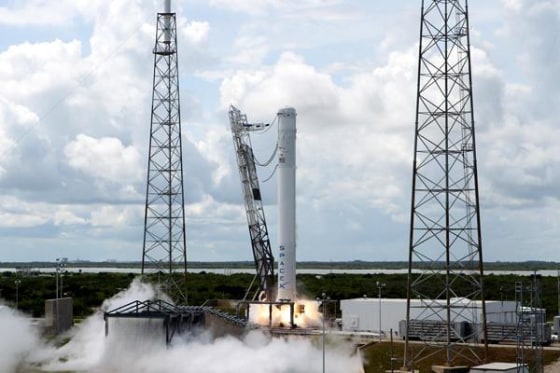SpaceX says it successfully test-fired the engines on its Falcon 9 rocket today in preparation for Oct. 7's scheduled liftoff of the California-based company's first official cargo delivery to the International Space Station.
The static-fire test at Cape Canaveral Air Force Station in Florida was considered the "last major test" in advance of the launch, SpaceX said in a Twitter update. The rocket was held down while its nine Merlin engines blazed for a couple of seconds on the pad, at the end of a computer-controlled fueling sequence. Data from the test will be analyzed in advance of the scheduled launch at 8:34 p.m. ET on Oct. 7.
This will be the first launch under the terms of a 12-flight, $1.6 billion NASA contract to resupply the space station. In May, a SpaceX Falcon 9 rocket sent an unmanned Dragon capsule to its first space station hookup, during a NASA-funded demonstration flight. The success of that mission cleared the way for cargo flights to begin in earnest.
Another company, Orbital Sciences Corp., is working on its own launch system for supplying the space station: The first stage of Orbital's Antares rocket is due to roll out next week in preparation for a hold-down test on its Virginia launch pad.
SpaceX is also working on a modified version of the Dragon capsule that could be used to transfer NASA astronauts to and from the space station, beginning in the 2015-2017 time frame. That effort falls under a separate NASA program that is also funding spaceship development efforts by the Boeing Co. and Sierra Nevada Corp.
Watch this brief video of today's static-fire test:
More about SpaceX:
- Cargo launch to space station set for Oct. 7
- Why SpaceX is setting the pace in space race
- Gallery: Ten players in commercial space race
- Cosmic Log archive on the new space race
Alan Boyle is NBCNews.com's science editor. Connect with the Cosmic Log community by "liking" the log's Facebook page, following @b0yle on Twitter and adding the Cosmic Log page to your Google+ presence. To keep up with Cosmic Log as well as NBCNews.com's other stories about science and space, sign up for the Tech & Science newsletter, delivered to your email in-box every weekday. You can also check out "The Case for Pluto," my book about the controversial dwarf planet and the search for new worlds.
